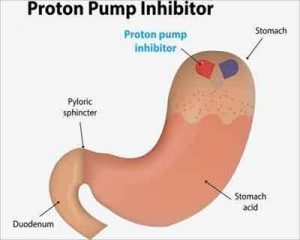- Home
- Editorial
- News
- Practice Guidelines
- Anesthesiology Guidelines
- Cancer Guidelines
- Cardiac Sciences Guidelines
- Critical Care Guidelines
- Dentistry Guidelines
- Dermatology Guidelines
- Diabetes and Endo Guidelines
- Diagnostics Guidelines
- ENT Guidelines
- Featured Practice Guidelines
- Gastroenterology Guidelines
- Geriatrics Guidelines
- Medicine Guidelines
- Nephrology Guidelines
- Neurosciences Guidelines
- Obs and Gynae Guidelines
- Ophthalmology Guidelines
- Orthopaedics Guidelines
- Paediatrics Guidelines
- Psychiatry Guidelines
- Pulmonology Guidelines
- Radiology Guidelines
- Surgery Guidelines
- Urology Guidelines
Proton Pump Inhibitors : Complications and Emerging Concerns of use

FDA approved indications of PPI use and which are-
- Healing of erosive esophagitis
- Maintenance of healed erosive esophagitis
- Treatment of GERD
- Risk reduction for gastric ulcer associated with NSAIDs
- Helicobacter pylori eradication to reduce the risk of duodenal ulcer recurrence in combination with antibiotics
- Hypersecretory conditions including Zollinger-Ellison syndrome
- Short-term and maintenance treatment of duodenal ulcer
Long-term use of PPIs have been associated with a number of diseases which are-
1.Association Likely Causative
1.Hypomagnesemia
2.Vitamin B12 Deficiency
3.Small Intestine Bacterial Overgrowth
2.Association Unclear
1.Bone Fractures
2.Clostridium difficile Infection
3.Acute and Chronic Kidney Disease
4.Dementia
3.Association Unlikely Causative
1.Community-acquired pneumonia (CAP)
2.Mortality
PPIs inhibit gastric acid secretion, and the most commonly associated adverse effects include abdominal pain, diarrhea, and headache. Although PPIs have had an encouraging safety profile, recent studies regarding the long-term use of PPI medications have noted potential adverse effects, including risk of fractures, pneumonia, Clostridium difficile diarrhea, hypomagnesemia, vitamin B12 deficiency, chronic kidney disease, and dementia. These emerging data have led to subsequent investigations to assess these potential risks in patients receiving long-term PPI therapy. However, most of the published evidence is inadequate to establish a definite association between PPI use and the risk for development of serious adverse effects. Hence, when clinically indicated, PPIs can be prescribed at the lowest effective dose for symptom control.
For further reference log on to : DOI: https://doi.org/10.1016/j.mayocp.2017.10.022

Disclaimer: This site is primarily intended for healthcare professionals. Any content/information on this website does not replace the advice of medical and/or health professionals and should not be construed as medical/diagnostic advice/endorsement or prescription. Use of this site is subject to our terms of use, privacy policy, advertisement policy. © 2020 Minerva Medical Treatment Pvt Ltd